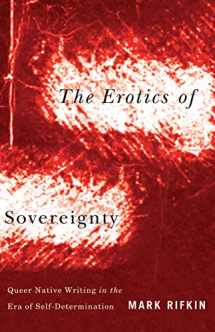
Erotics of Sovereignty: Queer Native Writing in the Era of Self-Determination
ISBN-13:
9780816677825
ISBN-10:
0816677824
Edition:
1
Author:
Mark Rifkin
Publication date:
2012
Publisher:
Univ Of Minnesota Press
Format:
Hardcover
328 pages
FREE US shipping
Book details
ISBN-13:
9780816677825
ISBN-10:
0816677824
Edition:
1
Author:
Mark Rifkin
Publication date:
2012
Publisher:
Univ Of Minnesota Press
Format:
Hardcover
328 pages
Summary
Erotics of Sovereignty: Queer Native Writing in the Era of Self-Determination (ISBN-13: 9780816677825 and ISBN-10: 0816677824), written by authors
Mark Rifkin, was published by Univ Of Minnesota Press in 2012.
With an overall rating of 4.3 stars, it's a notable title among other
books. You can easily purchase or rent Erotics of Sovereignty: Queer Native Writing in the Era of Self-Determination (Hardcover) from BooksRun,
along with many other new and used
books
and textbooks.
And, if you're looking to sell your copy, our current buyback offer is $0.57.
Description
In 1970 the Nixon administration inaugurated a new era in federal Indian policy. No more would the U.S. government seek to deny and displace Native peoples or dismantle Native governments; from now on federal policy would promote “the Indian’s sense of autonomy without threatening his sense of community.” In The Erotics of Sovereignty, Mark Rifkin offers a telling perspective on what such a policy of self-determination has meant and looks at how contemporary queer Native writers use representations of sensation to challenge official U.S. accounts of Native identity. Rifkin focuses on four Native writers—Qwo-Li Driskill (Cherokee), Deborah Miranda (Esselen), Greg Sarris (Graton Rachería), and Chrystos (Menominee)—approaching their fiction and poetry as forms of political theory. Rifkin shows how the work of these queer or two-spirit Native writers affirms the significance of the erotic as an exercise of individual and community sovereignty. In this way, we come to see how their work contests the homophobic, sexist, and exclusivist policies and attitudes of tribal communities as well as those of the nation-state.


We would LOVE it if you could help us and other readers by reviewing the book
Book review

Congratulations! We have received your book review.
{user}
{createdAt}
by {truncated_author}


